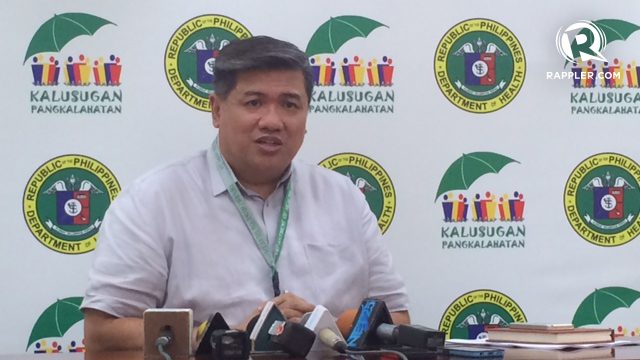SUMMARY
This is AI generated summarization, which may have errors. For context, always refer to the full article.

MANILA, Philippines – The Department of Health (DOH) clarified on Thursday, May 15, that its proposal to make HIV testing mandatory is not for all Filipinos, but for specific groups only, following a risk-based assessment.
Health Assistant Secretary Eric Tayag said in a recent television interview that Health Secretary Enrique Ona “would want to shift from voluntary testing to something that’s compulsory.”
But Republic Act 8504 or the Philippine AIDS Prevention and Control Act of 1998 clearly states “no compulsory HIV testing shall be allowed.” Instead, the State “shall encourage voluntary testing for individuals with a high risk for contracting HIV.”
For now, the department is looking at patients who will undergo surgery. Mandatory HIV testing can guide their doctors on how to provide the best treatment for them since they will be subjected to “a very stressful situation that can weaken their immune system.”
“Ang problema sa HIV pag bumaba ang immune system that’s when secondary infection comes in na kailangang i-address. Ayaw natin mas mapababa ang kanilang resistensya nang sa gayon ang recovery mas maging mabuti,” new Health Spokesperson Lyndon Lee Suy said on Thursday.
(The problem with HIV, when the immune system weakens, that’s when secondary infection comes in which needs to be addressed. We don’t want to further weaken their immune system so they can better recover.)
In due time, he said, they may also explore the possibility of requiring other high-risk groups to take an HIV test.
Amending the AIDS law
While nothing is definite yet when it comes to mandatory testing, one thing is for sure: the health department is looking at amending RA 8504.
Since the law was passed in 1998, Lee Suy said there may be a need to update approaches to HIV treatment in the country now that awareness is better and people are more open to the issue. (READ: Love in the time of HIV)
“The reason for this is kasi gusto natin na maging mas malawak ang nasasakupan ng law nang sa gayon ay mas malaki ang grupong mata-target natin para maka-avail ng gamot para sa HIV/AIDS,” he added.
(The reason for this is we want the law to be more inclusive of more groups so they can avail of medicines for HIV/AIDS.)
The department is already in “exploratory talks” with lawmakers who can bring up the issue and engage the public to see whether or not mandatory HIV testing and other approaches are feasible.
“It only shows we’re looking at all angles [and] not limiting ourselves to a segment only [because an HIV] positive can come [from] anywhere,” Lee Suy said in a mix of English and Filipino.
On Thursday, a network of HIV civil society groups said they will file a case against the DOH and will call for the resignation of Health Secretary Enrique Ona if the department pursues mandatory HIV testing. (READ: Mandatory HIV testing? Groups blast DOH chief)
Trace patients
The Philippines is one of 3 countries in Asia and one of only 7 countries in the world with a growing HIV epidemic. (READ: HIV-AIDS epidemic: A call to action)
The country recorded an 820% increase in a span of 9 years – from 173 cases in 2001 to 1,591 cases in 2010 – and there is an estimate of 14 new HIV cases every day.
DOH announced recently it has recorded a total of 1,432 HIV cases in the country this 2014, with 498 new cases as of March 2014. (READ: Know more about HIV with your mobile phone).
Lee Suy thinks the increasing number of HIV cases in the country can also mean more Filipinos are no longer embarrassed to come out and submit themselves for testing.
“At the end of the day, what DOH wants is to trace almost all, if not all of HIV-positive Filipinos, provide services and make medicines available for them. How will they enjoy these benefits if they are not tested?” he said in a mix of English and Filipino.
He also assured the public there are enough medicines available for patients.
“The mere fact that we’re looking for them, we’re assured as well that medicine will be provided for them,” he said. – Rappler.com
Add a comment
How does this make you feel?
There are no comments yet. Add your comment to start the conversation.